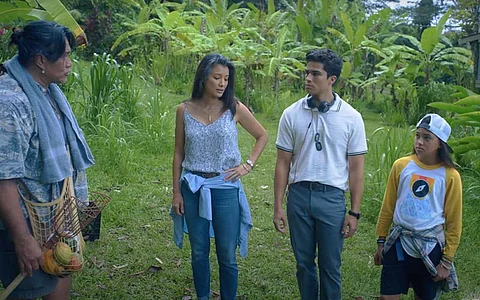
- Reviews
- Power List 2024
- Cannes 2024
- In-Depth Stories
- Web Stories
- News
- FC Lists
- Interviews
- Features
- FC SpecialsFC Specials

Director: Jude Weng
Writer: Christina Strain
Cast: Kea Peahu, Alex Aiono, Kelly Hu, Branscombe Richmond, Owen Vaccaro
Cinematography: Cort Fey
Editor: Priscilla Nedd Friendly
Streaming on: Netflix
Finding 'Ohana is at its strongest when it's being itself. Whilst this may seem like an obvious axiom for any film, this film in particular – a Netflix, family-friendly, children's adventure story – is separated from most of its peers not only by its strong sense of identity but its lack of hesitation in asserting the same.
As a concept, the film is fantastical enough to wrap its weighty exploration into the roots of our cultural identity, our relationship with 'home', and family (which is what 'Ohana' means in Hawaiian) in classic 'adventure' finery. Unfortunately, it doesn't manage to synthesise these themes with its central narrative – a couple of New York kids searching for treasure in Oahu, an island in Hawaii, after their mother needs to relocate there to take care of her father.
The film, directed by Taiwanese-born American, TV director, Jude Weng, doesn't do much to impress us visually and makes a lot of directorial choices that have become a convention in our era of streaming-platform-led Hollywood. But this doesn't matter. The film's biggest victory is the way it unapologetically shifts the 'default' setting for such films; moving away from White stories of similar coming-of-age themes to express its thoughts about a very specific culture (Hawaiian, to be precise). It is a perennial annoyance of mine to even have to put films in such a framework, yet, this film has no choice but to be a reaction to the history of films with its standing and likeness. In fact, maybe its bigger victory is that between emotional beats and tropes which feel obligatory, it still manages to show its tender, playful heart.
All of this is, no doubt, bolstered by a boldly envisioned and charming lead performance from child actress, Kea Peahu. Although most of the supporting performances are just serviceable, Kelly Hu and Branscombe Richmond – Hawaiians themselves – have a fantastic scene together, late in the film, which adds an edge to their otherwise blander, father-daughter story arc. I suspect that this scene, smartly written to create an unspoken argument through the switches between English and Hawaii, will resonate with most native bilinguals, and is another example of the film being at its strongest when it becomes about what it actually is (or wants to be).
If these scenes, which explore the complicated relationship that those caught between two cultures have with both their immediate family as well as their heritage, were unspoken more often, it might have helped blend the film better. Although it may seem that such a change would alter the film's identity – as it is, very obviously, a film targeted towards younger audiences – I think some boldness might have actually helped to cast a wider net whilst retaining its original target.
The conversations in the film often sag, despite some of the aforementioned moments of real heart, and undermine themselves by devolving into characters talking about themselves, the situations they find themselves in, and their emotional journeys through clunky and inauthentic exposition. Which is not to say that any of the experiences are inauthentic but that their expression is stinted. Maybe this is intentional if we must think of it as a film for younger audiences. The bottom line, however, is that although Peahu and supporting child actor Owen Vaccaro, share some crackling dialogue (including a wonderful critical assessment of Lost), the more the film tries to venture into fun, adventure territory, the more it ends up being like something we've seen before.
A good family film, however, needs to really hold all of its audiences' attention, as many classics of the genre have done before. When such a film stars a child protagonist, younger audiences identifying with them is inevitable. Then, especially, it needs to balance its tones and be able to communicate with this audience. Finding 'Ohana is still a film that I would probably recommend for most families watching with tweens but I wish that it made me more sure. The film is confident about its takes on cultural identity but one gets the feeling that it needs to find itself a bit more as a film.